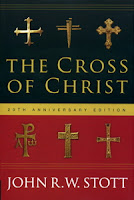 From John Stott's The Cross of Christ
From John Stott's The Cross of Christ
"Before we can see the cross as something done for us (leading us to faith and worship), we have to see it as something done by us (leading us to repentance)." (pp 59-60)
"If we spoke less about God's love and more about his holiness, more about his judgment, we should say much more when we did speak of his love." (p 132, quoting P.T. Forsyth)
"The priority [in the gospel] is neither 'man's demand on God' nor 'God's demand on men,' but supremely 'God's demand on God, God's meeting his own demand.'" (p 152, paraphrasing Forsyth)
"Divine love triumphed over divine wrath by divine self-sacrifice." (p 159)
"The essence of sin is man substituting himself for God, while the essence of salvation is God substituting himself for man." (p 160)
"As we stand before the cross, we begin to gain a clear view both of God and of ourselves, especially in relation to each other." (p 161)
"...whereas usually the one who sins and the one who dies are the same person, on this occasion they were not, since it was we who sinned, but he who died for our sins. This is love, holy love, inflicting the penalty for sin by bearing it. For the Sinless One to be made sin, for the Immortal One to die - we have no means of imagining the terror or the pain involved in such experiences." (p 214)
"No theology is genuinely Christian which does not arise from and focus on the cross." (p 216)
"Powerless wisdom or foolish power: it was (and still is) a fateful choice. The one combination which is not an option is the wisdom of the world plus the power of God." (p 225)
"[The cross] appears to be total defeat. If there is victory, it is the victory of pride, prejudice, jealously, hatred, cowardice, and brutality. Yet the Christian claim is that the reality is the opposite of the appearance. What looks like (and indeed was) the defeat of goodness by evil is also, and more certainly, the defeat of evil by goodness. Overcome there, he was himself overcoming. Crushed by the ruthless power of Rome, he was himself crushing the serpent's head (Gn. 3:15). The victim was the victor, and the cross is still the throne from which he rules the world." (p 228)
Monday, September 03, 2007
Monday Quotables
Posted by
Josh
at
8:25 AM
![]()
Subscribe to:
Post Comments (Atom)

No comments:
Post a Comment